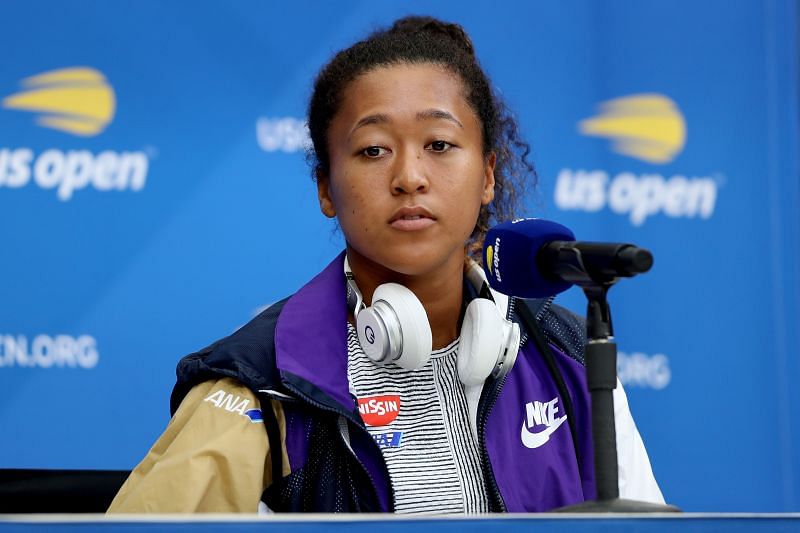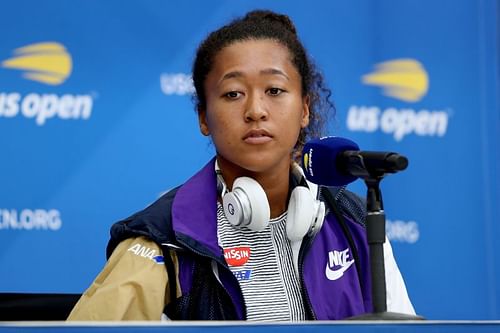
Why Naomi Osaka's Roland Garros media boycott is an important step in bringing mental health into focus

Sometime late on Wednesday night in Paris, World No. 2 Naomi Osaka issued a statement on her social media handles. Osaka announced that she wouldn't participate in any of the mandatory press conferences at Roland Garros, the claycourt Major that kicks off on Sunday.
Her reasons are simple. Naomi Osaka believes that the mental health of professional athletes is often disregarded, and that every press conference they participate in is proof.
"We're often sat there and asked questions that we've been asked multiple times before or asked questions that bring doubt into our minds and I am not going to subject myself to people who doubt me," Osaka wrote.
The cost of the 23-year-old's media boycott will be a fine for each match she plays at Roland Garros (which can go up to $20,000 per match). In other words, the further Osaka advances in the tournament, the more her position is likely to be talked about.
Incidentally, that is exactly what happened with her campaign for the Black Lives Matter movement at last year's US Open.
Noami Osaka is the world's highest earning female athlete, and everything she says or does makes news
For Naomi Osaka, the monetary fine - even if she goes all the way at Roland Garros - is unlikely to amount to much. Osaka is the world's highest earning female athlete this year, making more than $55 million from prize money and endorsement deals – a record for any female athlete in sports history.
The Japanese's brand value and business portfolio have grown manifold after her Grand Slam wins in New York and Melbourne, together with her stand against racial injustice. So it's safe to say that a statement like hers about boycotting press conferences is bound to create waves.
As expected, the tennis Twitterverse was abuzz with polarizing reactions immediately after Naomi Osaka's post. Some empathized with her and claimed she was well within her rights to boycott the press conferences and pay the fine, while others lauded her bravery in setting an example for mental health awareness.
However, many also claimed that such boycotts could reduce the connection between players and fans, and restrict media access to a few select journalists. Still others asserted that she is only doing this because she can afford to, given that the fine would be pocket change for her.
But in my opinion, the critics are missing the bigger picture. One of the first responses I saw on my tennis chat group following this news was a quip on the likely duration of Naomi Osaka’s stay in Paris this year.
"Wow, Osaka will skip both her press conferences at RG."
I didn't ask for a clarification, but I believe that was a shot at her poor clay-court record. My friend, it seems, expects Osaka to last only two matches in Paris.
There was, however, no comment on the larger issue that her statement is focusing on – the mental health of players. The way I look at it, my friend's comment reinforces Naomi Osaka's point; players do get kicked by fans and the media when they are down.
Naomi Osaka shines the spotlight on mental health
Sure, if a lot of players follow in Naomi Osaka's footsteps, then media coverage of the sports and its biggest stars will certainly go down. And that in turn will impact player earnings, sponsorships and a whole lot of other things.
But should that restrict a player from taking a stand about an issue related to conditions at their workplace (the tennis tour is a profession at the end of the day)?
The same journalists, or any one of us, would have complained about the conditions at our workplaces if they were negatively impacting us. Twitter itself is a good example of how so few of us suffer adversity in silence.
Moreover, Naomi Osaka is not batting just for herself with this move; she is, at least indirectly, batting for tennis players as a whole. Her media boycott will likely force tennis' governing bodies - often uncoordinated among themselves and rife with competing goals – into a tight spot.
And why shouldn't it? If the powers that be are actually neglecting the mental health of players, then it is certainly something that needs to be looked into.
How will Roland Garros and the tennis tours react to Naomi Osaka's boycott?
Last August, Naomi Osaka announced that she wouldn't play her semifinal match at the Western & Southern Open in support of the Black Lives Matter movement. In response, both the men's and women's tours backed her and decided to shut down the tournament for the entire day.
That is something I don't recall ever seeing before. But nobody can deny that it was the right thing to do, given the public sentiment around the issue at the time.
Over the past year, both the men’s and women’s tours have made a lot of efforts to raise awareness about mental health and help players deal with their demons better. That is why it is particularly intriguing to see what kind of response Roland Garros, the ATP tour and the WTA tour make to Naomi Osaka’s latest statement.
Will other players follow her lead? Will the tours allow some sort of leeway to the players given that we are still in the midst of a soul-crushing pandemic?
Noted journalist Ben Rothenberg has an interesting take on the matter, as seen in his tweet posted earlier today.
"Well alright then," Rothenberg wrote in response to Naomi Osaka's statement. "Honestly the fines for skipping press are so small for top players compared to their incomes that I’m surprised more top players don't do it regularly."
Naomi Osaka has gone a step further and expressed hope that her fines would go to a mental health charity, further amplifying the message she wants to send across. And that has made the likes of Jon Wertheim pause and think, especially with regard to the format and nature of tennis press conferences.
"Maybe this will cause us to rethink and improve the model," Wertheim wrote on Twitter.
Of course, Naomi Osaka is not the first player to talk about the "corrosive" impact of the media attention on young players. She had herself broken down while talking to the press at Wimbledon in 2019, and there have been many such instances with other players too.
Flashes of Jennifer Capriati breaking down at the US Open as she began her comeback from the wilderness, and Steffi Graf holding back tears while being questioned about her father’s paternity lawsuit, come to mind too.
A few months ago, former World No. 1 Victoria Azarenka lashed out at the press during the Australian Open when she was asked to talk about her medical condition. Azarenka claimed that players shouldn't have to discuss their medical issues on such a public forum, and her statement was almost as polarizing as Naomi Osaka's.
Even the tough-as-they-come Serena Williams left the 2021 Australian Open in tears following her semifinal exit in Melbourne. Incidentally, that defeat came at the hands of Naomi Osaka herself.
Also Read: "I'm done" - Serena Williams leaves press conference in tears following loss to Naomi Osaka
I’ve personally often wondered why the losing players are required to do a mandatory press conference within minutes of losing their match. They would be obviously deflated in such a situation, and most wouldn't have had the time to process or analyse the defeat or their emotions.
One of the arguments I have heard in favor of mandatory press conferences is that it is simply a part of the profession, and that it comes with the terrain of being a top tennis player. But that doesn’t or shouldn’t make it correct, right?
Lots of rules and checks have been put in place over the years to improve the working conditions in several professions. So why not do the same for tennis players?
Personally, as a fan or as someone who writes about tennis, I’d rather have fewer soundbytes from the likes of Naomi Osaka and Novak Djokovic and see them compete on the tour for a longer time. If mandatory press conferences take a toll on their emotional health and end up cutting short their careers, it just wouldn't be worth it.
But that’s just me. We are all entitled to our opinion, and not everyone has to agree on a particular topic. In this case, I stand with Naomi Osaka. What about you?